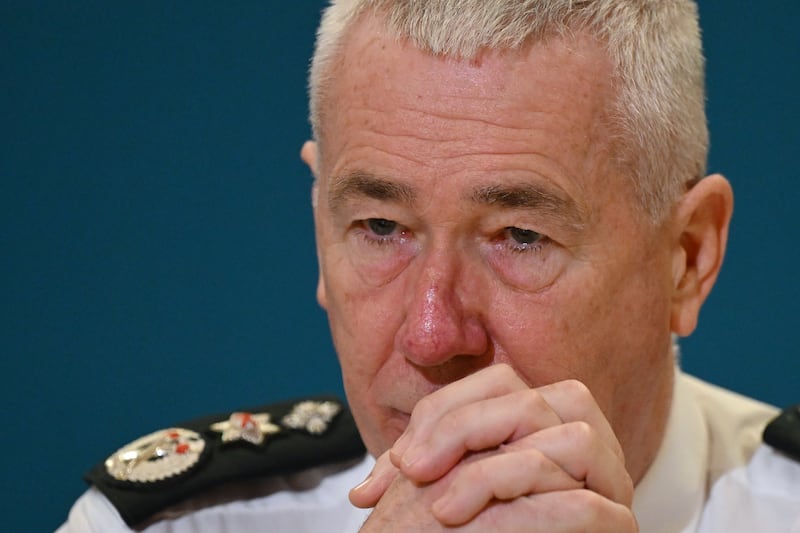During the local and European elections earlier this year, Sinn Féin canvassers in some of its heartlands area in Dublin were confronted with hostility on doorsteps.
The flashpoint was immigration. Tents erected by asylum seekers were lined along the canal. Around the State, there were stand-offs with local residents over proposed accommodation centres.
In Dublin, Sinn Féin was facing headwinds in some of its strongest areas, such as west Finglas, Coolock, Ballyfermot and the north inner city. At some doorsteps, the party’s candidates were called “traitors” and “unpatriotic”. In Coolock, a party member was attacked, sustaining a broken nose.
Sinn Féin had a poor election. But then, it also had poor local and European elections in 2019 but bounced back spectacularly in the general election seven months later. This time, though, the journey back seemed more perilous.
RM Block
When supporters turn against a party it is never a pretty sight. For a while, it seemed this general election for Sinn Féin might be a minor version of what happened to Fianna Fáil in 2011 after the farcical collapse of its government.
Back then, Fianna Fáil candidates faced similar anger from voters.
Outgoing TD Mary Hanafin was standing at a school gate in Blackrock as one young parent guided her young child through the gates. “Hi, I am looking for your support,” said Hanafin pleasantly.
“Fianna Fáil?” the woman asked. Before Hanafin could reply, she snarled: “I would rather stick pins in my eyes. You are a load of gangsters.”
That was then, this is now. Following candidates from different parties across five Dublin constituencies this time, it’s clear it’s not going to be a 2011 for Sinn Féin.
Soon after this summer’s elections, Sinn Féin leader Mary Lou McDonald visited many key Dublin heartlands spoke to community leaders, in order to lance the boil. The party also did a volte face on its immigration policies. Since then, too, the issue has become less fraught and emotional.
Two Sinn Féin TDs, Eoin Ó Broin and Mark Ward, are canvassing in Moorfield, a settled and attractive estate in north Clondalkin, where it usually pulls in 50 per cent of the vote. Ó Broin is an impressive operator on the ground. In another life, he would have made a great GP, with a mix of empathy and infinite patience for everybody he meets.
“We would have estimated during the [summer election] about 10 per cent talked about migration and the accommodation issues,” he says. “A lot of those conversations were decent. People wanted to know what’s going on and were expressing concerns. There was a portion of exchanges which were hostile.”
He said the issue is still being raised but not as often. “It’s perhaps the second or third issue. It does not have the same salience. At the time, it was soon after the riots and there were tents along the canal.”
The cost of living, housing, tax and access to healthcare are also big issues.
A young woman says her partner earns €50,000 and wants to know if there will be a change in tax bands as he feels the impact of cost-of-living hikes. Ó Broin explains the Sinn Féin plan to scrap the Universal Social Charge for anybody earning under €45,000.
There is not enormous engagement. There are some pledged votes, some are non-committal. “We are still thinking,” one woman tells the Sinn Féin canvassers.
“We really need a change,” Ó Broin urges her. “We are the only party that can do it.”
There is only one hard “No”, an immediate door slam. In another house, a relatively young woman says she can’t vote for Sinn Féin because of “legacy issues”.
Canvassing in Dún Laoghaire, the Green Party’s Ossian Smyth says that at this juncture in the campaign four years ago, the pension age issue championed by Sinn Féin had really taken hold and that people on doorsteps in all areas were talking about “change” and “Mary Lou”. “We are not hearing it this time,” he says.
There is no doubt in Dublin the Greens are feeling the negative effects of being the small party in Government. On the other hand, there has been a defanging of voter toxicity around Labour and Fianna Fáil.
In Tallaght, Fianna Fáil’s Teresa Costello is campaigning on the basis of her working-class roots and her understanding of the community. A cancer survivor and advocate, Costello is chatty and pleasant and gets positive engagement. She gets a few commitments of support but it’s striking how many people on the doorsteps have yet to commit.
The bicycle shed invariably crops up. “For the name of Holy God, somebody get hold of the Office of Public Works and, for feck’s sake, tell them to stop spending money like it’s going out of fashion. There doesn’t seem to be any accountability,” a woman in Kingswood tells Costello. “The other thing is the national children’s hospital. Nobody called a halt to that.”
One man tells her that Fianna Fáil and Fine Gael have been in power for too long. “It’s time to give Sinn Féin a twist,” he says.
In Beaumont, Paul McAuliffe of Fianna Fáil chats to a manwhose daughter has just graduated as a teacher but who, owing to cost-of-living issues and the cost of houses, will find it hard to stay in Dublin. “Her friends in the [teaching] class are thinking of going to Australia. It’s all to do with the cost of living,” he says.
McAuliffe points to the nearby new residential development of 800 homes on Oscar Traynor Road, saying the three-bedroom units will be available to some families at €360,000.
The Labour candidate in Dublin South-West Ciarán Ahern is canvassing in Kimmage along with party leader Ivana Bacik. A couple in their 60s say they are worried about “so many people looking for social housing and being on the dole”.
The man says: “I wasn’t handed a house. My kids weren’t handed their houses. When I hear people saying it’s a basic human right to have a house, and the Government should be building more houses for people, and it should be beside the mammy. I don’t agree with that.”
Immigration is mentioned, but more sporadically than in the summer. “We have loads of immigrants coming in, and they lose their passports between getting off the plane and arriving. I think that they should be sent back to wherever they came from,” the man in Kimmage tells Ahern and Bacik.
He says he has no trouble with people arriving who are willing to work in Ireland. They tell him Labour is the party of work and have proposals to ensure that all immigrants, including asylum seekers, can be allowed to work.
But no one issue is yet dominating, as housing did in 2020. Nor does there seem to be any huge momentum behind any party.
Perhaps we are looking at a scenario like the 2007 general election campaign, where after a fortnight of shadow boxing, everything was decided in the last week?
- Sign up for push alerts and have the best news, analysis and comment delivered directly to your phone
- Join The Irish Times on WhatsApp and stay up to date
- Listen to our Inside Politics podcast for the best political chat and analysis
- Sign up to our Inside Politics newsletter to get the behind-the-scenes take direct to your inbox



















